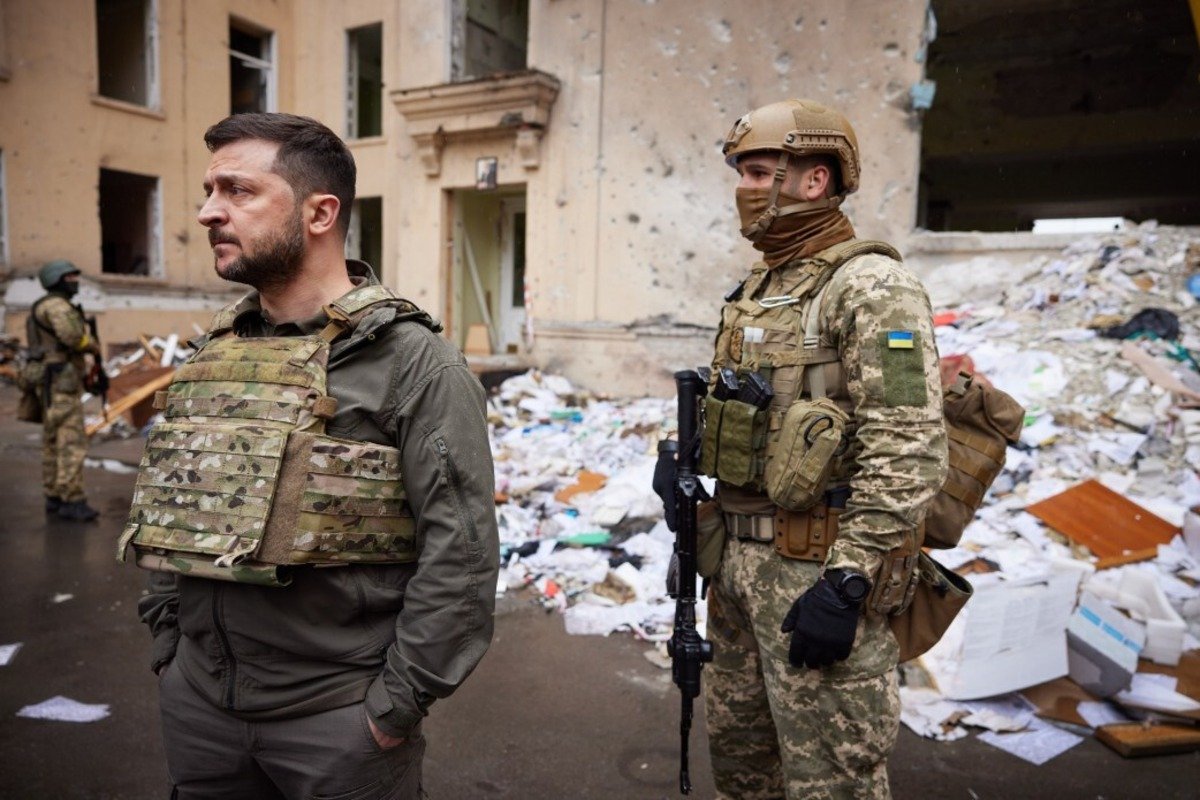Ukraine's second-largest city, located just miles from the Russian border, is an appetizing target for Moscow—and Kyiv knows it.
"Kharkiv is one of the capitals of Ukraine, so it has great symbolic meaning," Ukrainian leader, Volodymyr Zelensky, told German newspaper Bild earlier this month. Kyiv is "doing everything we can" to prevent Russian forces sweeping in and seizing control of the second-largest city in the country, the Ukrainian president added.
But there are pressing questions over how long Ukraine could hold out in and around Kharkiv if Kyiv remains starved of vital U.S. military assistance, and if Russia sets its sights on the major city, which had a pre-war population of nearly 2 million.
Even with the flow of aid to Ukraine stemmed, "a successful assault on Kharkiv would be a major undertaking for Russia, but not completely out of the question," said Jacob Parakilas, a research leader for defense strategy, policy and capabilities with the European branch of the RAND think tank.

With Kharkiv fewer than 20 miles from the Russian border, a "slow, grinding attack" could mean Moscow may be able to take control of the city within "months," he told Newsweek.
Its position close to Russian territory hands Moscow the tools to position and support its attacking forces better, Parakilas added. Crucially, too, Ukraine's armory is now much barer than it was last year, he said.
Ensnared in Congress, more than $60-billion-worth of assistance has failed, so far, to wind up in increasingly desperate Ukrainian hands. Funding ran out for President Joe Biden's administration in late 2023, and a $300-million injection pulled together from contract savings in mid-March was described by the Pentagon as a stop-gap measure in lieu of new packages.
A handful of weeks out from a predicted Russian summer offensive getting underway, the need for ammunition, air defenses and fresh supplies is deepening.
The determination is not lost, though. "In the event of an offensive, will the Ukrainian defense forces be able to defend Kharkiv without U.S. military assistance? We can!" said Colonel Andriy Zadubinnyi, a press officer with Ukraine's Khortytsia grouping of troops operating in northeastern Ukraine.
"But it will be at the cost of tens of thousands of lives of Ukrainian soldiers," each working to hold back a Russian military with more equipment and more troops, he told Newsweek.
"Without American help we will have a hard time," Zadubinnyi said. "But we have no choice. We have to stand to the death."
There are caveats to Russia's hypothetical assault on Kharkiv. The Kremlin may have the initiative on the battlefield, but it still struggles to execute effective combined-arms tactics, Parakilas added, as it throws its soldiers into high-casualty assaults.
"The Russian military can afford to take more losses for longer than the Ukrainians can," he said. Kyiv's military has been contending with how to refill its ranks, and earlier this month, Zelensky signed off on dropping the conscription age to 25, from 27.
However, "Russia is preparing to mobilize an additional 300,000 military personnel on June 1," Zelensky warned. The head of the U.S. European Command, General Christopher Cavoli, told U.S. lawmakers last week that Russia's army was 15 percent larger than in February 2022, and that it is learning the lessons taught by more than two years of war.
It is also not fully clear whether Moscow will prioritize Kharkiv, pulling resources away from fierce attacks in the Donetsk region, and Western experts are skeptical that Moscow could keep up the pace of its operations in the east while mounting a push further north near Kharkiv.
"The main efforts of Russian killers are concentrated in Donbas," Zadubinnyi said. "However, we cannot rule out any options."
Regardless, Kharkiv has borne the brunt of increasingly intense Russian focus in recent weeks. Strikes have laid waste to the city's energy infrastructure, and taken down a slew of buildings.
"Due to its proximity to the border, Kharkiv region is under regular Russian fire almost every day," Zadubinnyi said, adding that strikes are intended to sow fear deep among the region's residents. "The city of Kharkiv itself is shelled by the Russian Federation using guided aerial bombs and missiles of various types."
Ukrainian officials have reiterated their calls for air-defense systems, which Zadubinnyi echoed. It is "vital for Ukraine to protect the skies over Kharkiv," he said.
The Kharkiv region is "very important," Zelensky said during a visit to northeastern Ukraine last week. "We have to be prepared. And Russians must see that we are ready to defend ourselves," he said. "Our people must understand that Ukraine is prepared in case the enemy tries to attack."
Uncommon Knowledge
Newsweek is committed to challenging conventional wisdom and finding connections in the search for common ground.
Newsweek is committed to challenging conventional wisdom and finding connections in the search for common ground.
About the writer
Ellie Cook is a Newsweek security and defense reporter based in London, U.K. Her work focuses largely on the Russia-Ukraine ... Read more
To read how Newsweek uses AI as a newsroom tool, Click here.








